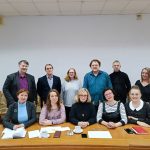At the IV International Conference “Education in the Modern World: Challenges, Evaluation, Solutions,” held in Moscow on August 30-31, Sergei Kravtsov, the head of the agency, recalled the task set in the decree of Russian President Vladimir Putin to ensure the entry of our country by 2024 in the top ten of the world’s leading countries in the quality of general education.
In his opinion, to reach the result, all necessary prerequisites are in place: a unified system for assessing the quality of education has been created, analysis and work with the results of various evaluation procedures, including with objective results of the USE, is already ranked first in the world in terms of readers’ literacy level primary school in the PIRLS study, and in the PISA study for 15-year-olds exceeded the average for the OECD countries and demonstrates one of the best dynamics in the world.
The key factors that should influence the improvement of Russia’s results, according to the head of Rosoboradnadzor, are standards that provide uniform requirements for the content, results and conditions of education, regularly updated teaching aids, an objective assessment of the results of students, the competencies of teachers and school principals and working with results of this assessment. “Then, despite all the diversity that exists in the education system of the Russian Federation, we can take first place. This is a very difficult task, but it is realizable, and the basis for such development is laid, “Sergei Kravtsov said.
In developing the competencies of graduates of 2030, the most relevant objectives are basic academic training, functional literacy, teamwork, independence in the formulation of goals and their achievement. Also the development of social and emotional competencies among schoolchildren, such as adaptability, attention, empathy, courage, correctness, perseverance, honesty and others is necessary.
News
- Happy New Year! 25.12.2023
- Quasi-adaptive version of SAM tests 21.12.2023
- Using SAM to Measure Computer Literacy 19.12.2023
- Working meeting of representatives of CICED with representatives of the National Center for Assessment of the Quality of Education (NCQA) under the President of the Republic of Tajikistan” 15.12.2023
- Working meeting of representatives of CICED with representatives of the National Institute of Education of the Ministry of Education and Science of the Republic of Belarus 12.12.2023
- Working meeting of representatives of the Center for International Cooperation for the Development of Education with the Deputy Minister of Education and Science of the Kyrgyz Republic and representatives of the National Center for Assessment of the Quality of Education and Information Technologies under the Ministry of Education and Science of the Kyrgyz Republic (NTSOKOIT) 07.12.2023
- Working meeting of representatives of the Center for International Cooperation for the Development of Education with representatives of the Center for Assessment and Testing (ACT RA) under the Ministry of Education, Science, Culture and Sports of the Republic of Armenia 05.12.2023
- International cooperation of CICED in 2023 27.11.2023
- Progress on girls’ access to education: What the new UNESCO data reveals 23.10.2023
- 44 million new teachers must be recruited by 2030 to achieve our education goals 29.09.2023






